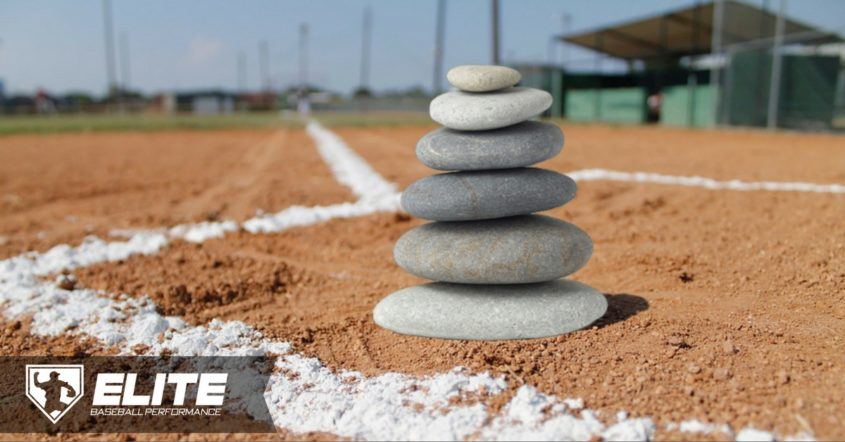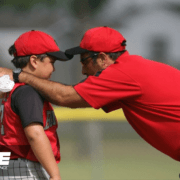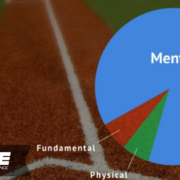A Daily Mental Practice for Baseball Players
This is not football, basketball or hockey – it’s baseball. And of the four “major” sports in the United States, baseball is by far the most mentally challenging and demanding.
Demanding, because there is so much dead time compared to other sports. Dead time gives baseball players lots of time to think, and thinking is often at the root of tension, pressure and anxiety.
Challenging, because baseball players spend most of their time on physical preparation and little or no time on the one area that is going to impact their career the most. Yes, the mental game is being talked about a lot more these days, but talking isn’t good enough. It’s time to cut to the chase. Doing something about it is where the rubber hit’s the road.
Addressing The Mental Game: Prioritizing Your Practice Plan
Practice plans have been passed down for generations, and they of course have plenty of merit. But at what point (and what cost) are we going to continue to center our practice plans around physical preparation when we know that between the lines, the game is at least 90 percent mental? Hitting, throwing and running bases are all indispensable, as is bunt defense, pitchers fielding practice and first and third run downs.
But this is the 21st century – times have changed.
People in all walks of life are looking deeper for answers. Major corporations are putting a ton of money into creating a (mentally) healthier work environment by putting time aside for “self improvement.” Among other things, motivational speakers and yoga instructors are being brought in to help people relax and be more effective. When it comes to big business, they understand the bottom line, performance.
Sacrificing some time out of an employees busy work schedule for “mental health” is viewed as a necessity. Yet, somehow this hasn’t seemed to translate into the baseball community. Not that some teams (The University of San Diego has incorporated relaxation exercises prior to every practice) and individual players haven’t made the adjustment, but quite frankly, it’s a drop in the bucket.
The good news is that society is changing for the better. More than any other generation in the past 50 years, this generation is privy to the reality that Mental Training is not only a credible field, but it’s application to sports and life is a essential. Which begs the question — what are you doing to act on this reality? Until coaches start recognizing that Mental Practice is also an indispensable part of their daily practice plan, players are going to be deprived of developing the single most important asset in their career (their life), which is their mind.
The goal of this article is not to suggest that coaches have to go back to school to get their Master’s Degree in Sport Psychology. It is to give coaches a deeper understanding into why players perform a certain way, and more specifically, what can be done on a daily basis to support the players both from a strategic (terminology) point of view, as well as a practical point of view.
Done as a precursor to practice each day, each coach will be given enough information to lead his players through a 10 minute, mental training exercise or session that revolves around breath work.
Ultimately, whether we call “mental practice” relaxation, meditation or mental focusing time, the application of these exercises on a daily basis will have the greatest and most profound effect on your players minds. For without practice how can you expect any skill to be developed and maximized.
Understanding Where We Want To Be: The Zone, Locked In, Unconscious
Having a great mental game is as much about understanding where we want to be, as where we don’t want to be.
When things are going well it seems like the mental game is simple. And when things aren’t going so well the game can be very frustrating and complex. Understanding “how” we go in and out of these states of mind is extremely valuable.
In sports, we actually have many terms for this “optimal” state of mind. It’s been referred to by many names, including “The Zone”, being “Unconscious” and being “Locked In.” The technical term for this state of mind is called a Peak State, and has very specific attributes, including:
- The absence of thought
- A complete immersion with the action
- A sense of being process oriented
- A sense of calm or peace
- A detachment from the outcome.
By understanding the components of a peak state of mind, we can better understand ways to train the mind in order to put it in alignment with this ideal state.
Identifying the Problem: Consequential/Result Oriented Thinking
To better understand how to access this peak state, we have to first ask a very important question – what is the current state our mind is in? To do this, we need to look further into those factors that are responsible for the infrastructure of how we think.
The most logical place to start with is the environment we’re raised in. If you were raised in the United States chances are that you were exposed to a culture that breeds a state of mind that in many ways is the antithesis of the components of a peak state of mind. What I mean by this is that most people have been “programmed” by a society that places a great deal of emphasis on thinking and a preoccupation with the consequences or results of their actions. This preoccupation with thinking as opposed to reacting, and attachment rather than detachment from the outcome have become part of our psychology, and on a physical level, our neural pathways.
Attachment to the outcome is what is referred to as consequential, or “result oriented thinking.” Due to the nature of society most people are exposed to a great deal of this programming at an early age, including how we are “graded” in school, and how we are judged by our peers. Couple that with the culture of sports, where we are constantly measured by our statistics, our wins, losses and teammates, and you can see why it would make sense that our minds are conditioned to think about the results of our actions, rather than the action itself.
More so, these behaviors are more likely to be prevalent in game situations, where a greater premium is placed on performance. Though a peak state of mind tells us that we would like to stay in the present and be detached from the outcome, the mind tends to default to it’s old programming, because this is what it knows – this is what it’s familiar with.
The “Default” System
Thus, you can see how vital a mental practice would for the typical player who’s default system is trending him away from a peak state of mind. This is where the role of mental practice becomes vital. Though good advice and mental strategies can be very effective toward changing the mind for the better, mental practice is at the root of “unearthing” old programming, and replacing it with new programming. Ultimately, we want the mind to be well practiced at being clear, relaxed and process oriented…we want the mind to default to a “peak” state…a state devoid (or at least minimized) of consequential or result oriented thinking.
This is perhaps the most critical concept to understand about making a change in your mental game for the better. For without understanding this “default system”, players may continue to put thousands of hours of hard work into physical practice and not understand why it’s not translating into game situations; why being “immersed in the present moment and detached from the outcome” is the exception, rather than the rule.
Understanding why the mind tends to default into consequential thinking when our sole objective is to be in a non-thinking and process oriented state, is crucial.
Creating A New Default System
One question I can hear being asked is, “Why is mental practice necessary if we could just tell our minds not to think about results or consequences, and just think about the “process?” Well, that would be a good start, but the mind has years of old programming, and to change the default takes a consistent and committed practice.
Ultimately, it is the practice that leads to the change of old ways of thinking, old behaviors and new neural pathways.
Breath Work: The Core Ingredient Of Your Mental Practice
Mental Practice is a very broad field that includes breathing exercises, imagery, visualization, affirmations, and so on. You can also get forms of mental practice from among other things, Yoga, Martial Arts and being in Nature. Anything that brings the mind into a state of “presence”, a state of peace and quiet can be categorized as mental practice.
But the most common element that I’ve found in mental practice revolves around the breath.
There are many reasons why the breath is at the center of mental training exercises universally, including several physiological benefits (relaxation, lower blood pressure, oxygenation), but some of the other profound benefits may be more subtle. For example, the breath is always happening now, which symbolically, can be extremely helpful in teaching the mind how to be present. The breath is not a thought, thus, the more time you spend with your breath, the more time you are training your mind how to be in a “no-thought” state. Again, the absence of thought and being present are two major characteristics of a Peak State of mind. Thus, the breath alone can be a catalyst in changing the mind from a result oriented default, to a process oriented default.
Other benefits that can often be associated with breath work include calmness of mind, improved concentration, focus, patience, discipline and inner trust. Inner trust, which is similar to the term confidence, is a by product of spending time in a relaxing and comfortable space each day, and getting to know your self and your inner workings. Considering that your breath keeps you alive 24 hours a day, it’s safe to say that a lot can be gained simply by spending time, appreciating and understanding our breath.
Looking where to begin?
Control your breath. Learn how to take deep breaths, in your your nose, out through your mouth. Let your belly expand, not your neck. Try this during your practice sessions and see how you fell. Over the next couple of months, I’ll be writing more on the mental game of baseball. Subscribe to the EBP newsletter to be sure you see the upcoming articles.
Want to Learn More About the Mental Game of Baseball?

Alan Jaeger
Latest posts by Alan Jaeger (see all)
- Building Your Offseason Baseball Throwing Program - October 24, 2017
- A Daily Mental Practice for Baseball Players - September 12, 2017
- Keys to an Inseason Throwing Program - March 1, 2017











Great Article Alan! Playing such a mental game for so many years had many peaks and valleys. It is encouraging to know experts are focusing on expanding such an intangible tool. Wish I was 15 grasping this concept, unfortunately I’m thirty and passed my prime from a baseball standpoint. However, being process oriented can have profound effects on our everyday activities. Look forward to reading more.
thx so much Rocky!! Appreciate the feedback! Alan
It is true that by daily mental practice you can achieve everything you want .Why not a baseball game player ? Specially I like the 5 technical terms for sports which need to recover state of mind
Haha ahahahhahahahhahahahah
Bao Jianfeng smashed out the plum blossoms from the bitter cold
It’s interesting to know that baseball requires some breathing exercises. I’m planning to encourage my son to join a high school baseball club. That way, he can stay active and be able to be more active on some of his crucial years when growing up.
Very cool Alice!! Like it…thx for the feedback!!
I am glad the mental game is being talked about a lot more. I love seeing games. But having them talk about their mentality before, during, and after each game would be awesome.
This post really resonated with me! I appreciate the emphasis on mental practice and how it can elevate our performance on the field. The tips for visualization and focus techniques are actionable and easy to incorporate into daily routines. Can’t wait to implement these strategies in my training!
This is a fantastic reminder of how crucial mental training is for athletes! I especially appreciated the emphasis on visualization techniques—I’ve found that it really enhances my focus during games. Looking forward to incorporating more of these strategies into my daily routine!
Great insights in this post! I love the emphasis on mental practice for baseball players. It’s a crucial aspect of the game that often gets overlooked. I’ll definitely be incorporating some of these techniques into my routine. Thanks for sharing!
Great insights on the importance of mental practice! It’s fascinating how much mental conditioning can impact performance on the field. I’m excited to implement some of these strategies into my routine. Thanks for sharing!
This post really resonated with me! I never realized how important mental practice is for my performance on the field. The techniques you shared are practical and easy to incorporate into my daily routine. I’m excited to start applying these strategies and see how they impact my game. Thanks for the insights!
This was a really insightful read! Establishing a daily mental practice is such a game-changer for athletes. I love the emphasis on visualization techniques and how crucial they are for maintaining focus and confidence on the field. Definitely going to implement these strategies into my routine! Thanks for sharing!
This post really highlights the importance of mental practice in baseball! It’s great to see techniques that can enhance focus and resilience on the field. I’ve started incorporating some of these exercises into my routine, and I’ve already noticed a positive impact on my performance. Thanks for sharing such valuable insights!
Great insights on integrating mental practice into daily routines! I love how you emphasized visualization techniques — they really do make a difference on the field. Looking forward to trying out some of these strategies myself!
Great insights on the mental side of the game! I love how you emphasize consistent practice not just physically but also mentally. This will definitely help me enhance my performance on the field. Thanks for sharing!